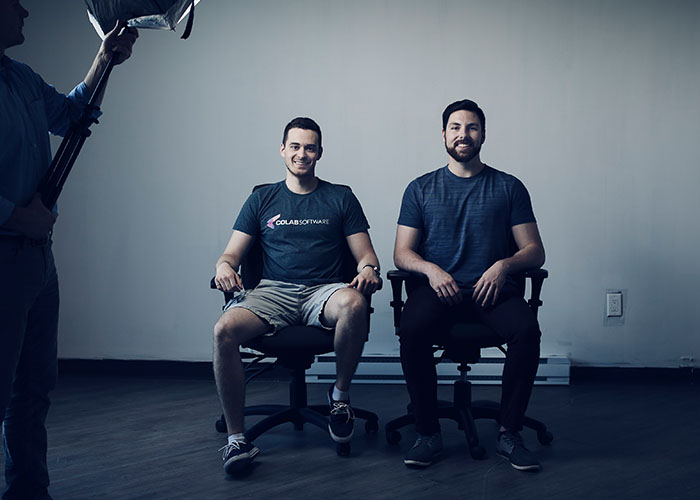DESIGNING BETTER, TOGETHER
By Lisa Pendergast

REMEMBER THE LAST time you turned down a job offer from Silicon Valley? Maybe not. But that’s exactly what Adam Keating and Jeremy Andrews did to follow their vision with tech startup, CoLab Software. The product at the heart of the company is a software platform they call Gradient.
“Our goal is to help engineering teams streamline their design review process and resolve issues faster,” said Mr. Keating. “We’ve created a simple interface that is really about changing the way people work together on engineering projects.”
It’s an idea that started with a transformative student experience.
Mr. Keating and Mr. Andrews first met as mechanical engineering students at Memorial, working closely together with Paradigm Hyperloop — an international team of engineering students from Memorial University, College of the North Atlantic and Northeastern University.
Up against student teams from around globe, Memorial entered the SpaceX Hyperloop Pod Competition in 2017. An initiative of SpaceX and Elon Musk, the competition is based on their hyperloop concept, a tube, or series of tubes through which a pod may travel at high-speeds by significantly reducing, or eliminating air resistance, or friction.
The Memorial-led group was one of 24 finalists in 2017. The team eventually took second place with their transport pod reaching a top speed of 101 km/hr. They were the only North American team to be awarded the chance to test their pod in the SpaceX Hyperloop tube and they made history as the first team ever to use an air-bearing system.
While preparing for the hyperloop competition, Mr. Keating was working from St. John’s and Mr. Andrews was in Ottawa. They both say it was a challenge.
“Trying to build this vehicle on Google Hangouts, or the phone every night — we realized pretty quickly that collaborating on design work like this was difficult,” said Mr. Keating. “At first we thought it was a student thing and we just didn’t have the proper resources. But when Jeremy worked at Tesla and I worked at Reflexion Medical for our co-op. placements, we saw these big companies using spreadsheets, slide decks and emails to track things. It seemed pretty archaic considering the technologies they were building.”
The solution became their startup. They launched CoLab Software and developed Gradient, their signature, cloud-based design platform. The interface allows engineering teams to execute design reviews and manage issues in one space, no matter where people are physically located. The goal is to allow users to create technology in a cost-effective way that avoids unnecessary time delays and miscommunication.
I think when people hear the word “innovative”, they think there has to be some sort of crazy step change in technology, but I don’t think that’s true. I think innovation is taking technologies and combining them in a way that solves a practical problem.– Jeremy Andrews
CoLab has already enjoyed early success, earning $600,000 in pre-seed financing, expanding to 16 employees and attracting advisors from companies such as Tesla, Google and Bosch North America.
The duo credits the Memorial Centre for Entrepreneurship (MCE), the Faculty of Engineering and Applied Science and GlobalNL as their greatest supporters.
“After graduation, we worked at MCE and most of our support came from them,” said Mr. Andrews. “Also, we received a lot of support through GlobalNL. They are a group of Newfoundlanders and Labradorians, a number of whom are ex-pats and have been successful in their careers. They want to give back in some way, be that advice, or financial support and we’ve received a lot of great advice and mentorship through that network.”
The pair also note the engineering co-operative education program at Memorial as a valuable experience. Mr. Keating says the co-op. opportunities were the “best part” of his degree program.
“While I was working in California, people would say, ‘Wow, you get to do all of these internships while you’re in school?’ and these are graduates from schools like MIT and Stanford. It was pretty cool to hear that.”
With these young, innovative Memorial alumni choosing to stay in the province, the future of Newfoundland and Labrador looks bright.
“I think when people hear the word “innovative”, they think there has to be some sort of crazy step change in technology, but I don’t think that’s true,” said Mr. Andrews. “I think innovation is taking technologies and combining them in a way that solves a practical problem. That’s how this all started. It’s motivating to see the team we’re building and the learning that comes from this experience. It gives hope for the future.”

